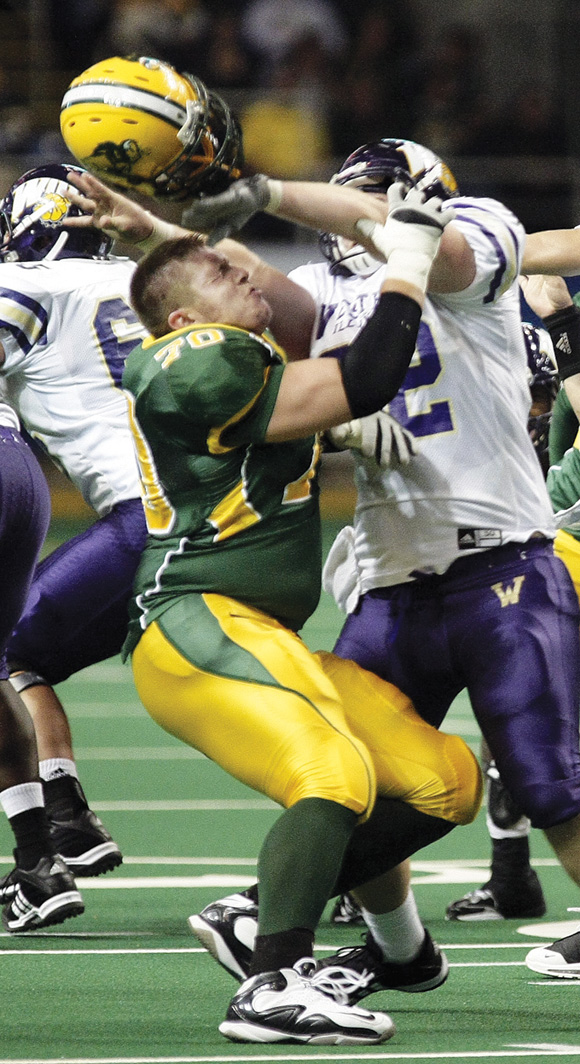Will the Mighty Fall?
increasing safety concerns force us to imagine a day without football

2011 was a memorable season for the Colby High School football team, taking home the WIAA Division 5 State Championship. Naturally, the first thing returning Eagles players are thinking for next season is the defense of their title, while eager players across the state hope instead to be the ones hoisting the trophy this November. Yet there may come a day, perhaps 15, 20 years from now, when those players’ sons, rather than prepping to take the field for another state title on the gridiron, get ready for some other sport’s tournament – a sport not as dangerous as that now-banned high school game: football.
The notion of football being banned at the high school level is absurd, and is likely never to happen. Several months ago, however, I would not have included the qualifier “likely.” A spate of stories have recently emerged in sports media talking about growing concern over the safety of football, especially relating to issues of head trauma and concussions.
Two stories in particular caught my attention. One, a column at the ESPN-related Grantland.com, titled “What Would the End of Football Look Like?,” laid-out a worst-case scenario where lawsuits over brain injuries to, and suicides by, young football players leads to the sport being shut down in many areas of the country, as many organizations and school districts decide they cannot afford – literally or figuratively – the cost of concussion-related football injuries. A couple weeks later, Hall of Fame quarterback Troy Aikman, who suffered several concussions in his career, speculated that such head trauma could lead to the downfall of the NFL as the most-popular league in the country. When two high-profile articles come out in short succession, a trend must be recognized: football has a potentially serious problem.
You may ask, ‘How does football ever become banned or unpopular? We like the hits and the violence, and most of us don’t play it, we just watch it.’ All good points, and all reasons why football is likely to remain exceedingly popular. Again, note that I said “likely.” Other sports have seen their massive popularity swoon for varying circumstances, like boxing, horse racing, and baseball. Football is not immune. The fall of football happens for reasons different from why you or I watch the game.
The notion of football being banned at the high school level is absurd, and is likely never to happen. Several months ago, however, I would not have included the qualifier “likely.”
Here is a local worst-case scenario. Imagine a game in the autumn of 2013 between Hudson and Rice Lake. A Rice Lake tight end receives a helmet-to-helmet hit from a Hudson linebacker, gets knocked down, but is able to walk off the field with help from his teammates. He’s woozy and has to sit-out the rest of the game, but eventually returns to action in the coming weeks. He graduates in 2015. The next spring, he commits suicide, despite living what his friends and family consider a “normal” life.
Upon his death, an autopsy discovers his brain suffered from chronic traumatic encephalopathy (CTE), a disease found in brains of other former football players who ended their own lives or had later-life cognitive problems. The family of the player files a class-action civil lawsuit against the WIAA, joined by other families of injured players throughout the state, and the resulting verdict is a multi-million dollar fine. Similar lawsuits with significant financial penalties are prepared for the school districts featuring the injured players – and the players who contributed to the injury.
Faced with a coming budgetary blow and concerned parents pulling their kids from football out of fear their child will get hit – and then get hit with the disease – Hudson and Rice Lake shut down their football programs, as do numerous other districts statewide. The trend picks up across the country, the football talent pool dries-up, and many talented players we watch in the NFL never play the sport, instead choosing or forced into something safer.
As much as I love football, I decided that I will not let a future son of mine play the game. I imagine others my age are making similar considerations. The sport needs to address these safety issues sooner than you may realize. Otherwise, the day may come when kids in Colby and elsewhere wonder how anyone would have subjected themselves to the risk of winning a football trophy.


















